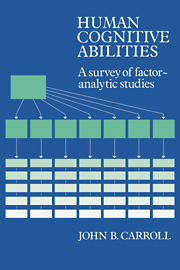Book contents
- Frontmatter
- Contents
- Preface
- PART I INTRODUCTION TO THE SURVEY
- Chapter 1 The Study of Cognitive Abilities
- Chapter 2 Historical Foundations of the Study of Cognitive Abilities
- Chapter 3 Survey and Analysis of Correlational and Factor-Analytic Research on Cognitive Abilities: Methodology
- Chapter 4 Survey and Analysis of Correlational and Factor-Analytic Research on Cognitive Abilities: Overview of Outcomes
- PART II THE IDENTIFICATION AND DESCRIPTION OF COGNITIVE ABILITIES
- PART III ISSUES
- References and List of Datasets
- Appendix A Codes for Countries, Samples, and Factors
- Appendix B Hierarchical Factor Matrix Files
- Name Index
- Subject Index
Chapter 2 - Historical Foundations of the Study of Cognitive Abilities
Published online by Cambridge University Press: 29 September 2009
- Frontmatter
- Contents
- Preface
- PART I INTRODUCTION TO THE SURVEY
- Chapter 1 The Study of Cognitive Abilities
- Chapter 2 Historical Foundations of the Study of Cognitive Abilities
- Chapter 3 Survey and Analysis of Correlational and Factor-Analytic Research on Cognitive Abilities: Methodology
- Chapter 4 Survey and Analysis of Correlational and Factor-Analytic Research on Cognitive Abilities: Overview of Outcomes
- PART II THE IDENTIFICATION AND DESCRIPTION OF COGNITIVE ABILITIES
- PART III ISSUES
- References and List of Datasets
- Appendix A Codes for Countries, Samples, and Factors
- Appendix B Hierarchical Factor Matrix Files
- Name Index
- Subject Index
Summary
I found that every science required a speciall and particular wit, which reaved from that, was little worth in other sorts of learning.
Juan Huarte (1575)In Chapter 1, the kinds of questions deemed most important to ask about cognitive abilities were listed and discussed. The present chapter gives an account of how these questions have been dealt with in the past. It begins with a brief history of mental testing, followed by a history of the development of factor analysis as applied to the identification of cognitive abilities and the determination of their structure and organization. A third part consists of a treatment of the several models of intelligence that have been derived from factor-analytic investigations. Finally, there is a presentation of recent developments in cognitive psychology that suggest new ways of viewing problems of individual differences in cognitive abilities.
A BRIEF HISTORY OF MENTAL TESTING
Several histories of mental testing are available. Works by Peterson (1925) and Sokal (1987) are good sources for the early period; books or articles by Tuddenham (1962), Linden and Linden (1968), DuBois (1970), and R. M. Thorndike and Lohman (1990) bring the history up to a more recent date. In a chapter (Carroll, 1982) in Sternberg's (1982) Handbook of Human Intelligence, I have traced the history of the mental testing movement – with special attention to its methodological aspects and with a focus on group intelligence testing – through two somewhat arbitrarily defined periods:
- Type
- Chapter
- Information
- Human Cognitive AbilitiesA Survey of Factor-Analytic Studies, pp. 30 - 72Publisher: Cambridge University PressPrint publication year: 1993



